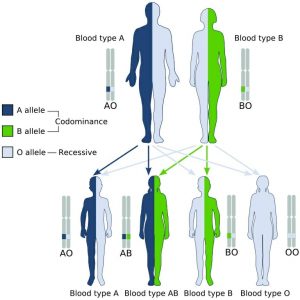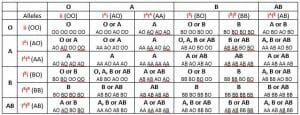Blood Basics
In humans and other vertebrates, blood is the main transport mechanism in the body which carries oxygen and nutrients to the tissues and removes carbon dioxide and other waste. The blood is also the major component of the immune system because it contains white blood cells and immune factors. Two other functions of the blood are regulating body temperature and forming blood clots to prevent excess blood loss.
A person inherits their blood type through their parents. There is one gene on the long arm of chromosome 9 called the ABO gene which codes for the enzyme glycosyltransferase. This enzyme changes the carbohydrate groups of the antigens on the surface of red blood cells. How the groups are modified determines the person’s blood type. Knowing blood types is important for blood transfusions, organ transplants, and paternity testing.
The Discovery of Blood Types
The first researcher to classify blood into four groups was the Czechoslovakian scientist Jan Janský in 1907. He labeled the groups I, II, III, and IV. However, other researchers had independently identified some of the blood groups years earlier and they received all the attention, drowning out the importance of Janský’s later work. In 1900, Austrian scientist Karl Landsteiner identified the A, B, and O blood groups and was awarded the Nobel Prize in Physiology and Medicine in 1930. In addition, in 1902 the Austrian scientists Alfred von Decastello and Adriano Sturli discovered the AB type.
How Blood Type is Inherited
There are three alleles for the ABO gene – IA, IB, and i, which produce type A, type B, and type O blood, respectively. IA and IB are dominant over i, therefore only people with ii (one gene from each parent) have type O blood. People who have IAIA are type A, IBIB are type B, and IAIB gives type AB. Since both IA and IB are dominant, if a person has this allele pair there is codominant expression, meaning both are expressed equally, resulting in type AB blood (see Figure 1). Table 1 below shows the allele combinations offspring can inherit based on the genes of the parents.

Figure 1 – The image above Illustrates the codominant inheritance of ABO blood groups.

Table 1 – Blood group inheritance from parents to offspring. The 4 pairs of alleles in smaller font are the genotypes based on the parental alleles. Note the only way the result will be type O with no other possibility is when both parents are homozygous recessive for type O. Otherwise, A or B dominate or are codominant as type AB.
The Rh Factor
Besides their ABO blood group, a person’s blood type also includes a plus or minus sign (+ or -) indicating whether they have the Rh antigen (a protein) on their red blood cells, also discovered by Karl Landsteiner. There are 2 alleles on the short arm of chromosome 1 of each parent, showing that the Rh factor is inherited independently from the blood type. The Rh- allele is recessive, so for a person to have this blood group, their genotype must be Rh-/Rh-. To be Rh+, a person must inherit at least one Rh+ allele; i.e., Rh+/Rh+ or Rh+/Rh-. There are 35 human blood group systems, and ABO and Rh are the two most important for transfusions and transplants.
References
- ABO Blood Group System. (n.d.). In Wikipedia. Retrieved March 28, 2018 from https://en.wikipedia.org/wiki/ABO_blood_group_system
- Lawler, S.D. and Berkman, E. M. (2018). Blood Group. In Encyclopedia Britannica. Retrieved from https://www.britannica.com/science/blood-group
